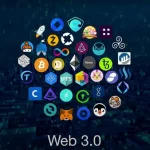Music has been around since the dawn of humankind, and the music business has always been pretty much the same: audiences pay money to enjoy their favorite songs. In the Middle Ages, wealthy people would pay minstrels to perform in their homes. Centuries later, music lovers purchased their favorite songs pressed on vinyl.
Quite a bit has changed in the music industry since the days of wandering minstrels and record shops, though. Today, people are purchasing music online and listening on digitized platforms. This is especially true in the wake of the pandemic, which shuttered thousands of venues and put music tours on hold. There are even new ways to purchase music – including the use of NFTs.

NFTs, or non-fungible tokens, are the newest generation in currency. NFTs could also breathe new life into a music industry in great need of a second wind.
About NFTs
NFTs are tokens, which consumers can use like currency to buy and sell goods. Specifically, NFTs are used to purchase digital goods, such as memes, pictures, Tweets, and music.
NFTs use cryptocurrency technology, like Bitcoin or Ethereum. Consumers carry cryptocurrency in secure digital wallets. Artists offer their wares and consumers place bids in the form of tokens.
Traditional bank accounts use old-fashioned records to keep track of transactions. Cryptocurrency, by comparison, uses blockchain technology to track transactions between digital wallets. Each transaction bears a timestamp, which protects the transaction data from alterations or tampering. All users of the blockchain can see a copy of the data. This adds a layer of security, as would-be thieves would have to change the transaction records involving the currency in order to steal the money.
NFTs – Music to Artists’ Ears
The introduction of NFTs come at a time when musicians, bands, and others in the music industry are facing some of the biggest challenges of their careers. Musicians rely heavily on ticket sales and sponsorships from live performances. Unfortunately, restrictions on congregating indoors and restrictions on large outdoor gathers dealt a heavy blow to performing musicians.
As their traditional revenue streams dried up, artists began looking for new ways to keep the money flowing. Some searched for loopholes or worked around regulations by hosting socially distanced events, but restrictions reduced crowd sizes to the point that holding concerts was just not profitable. Others held online concerts, but many musicians struggled with the technology required to livestream events. Broadcast from their homes in front of a curtain instead from a soundstage with a full complement of lights and special effects, many of these shows fell flat. Without sound engineers to work their magic, much of the music fell flat as it traveled across the internet. By the time the performance reached concert-goers, who watched the show from their cell phones and tablets, the music often felt muted and canned.

Even with the livestreams and reduced-audience live events, the pandemic cost the live event industry more than $30 billion by the end of 2020. Months later – well into live concert season – most musicians are still left without paying gigs, and the lack of work is emptying their pockets. In fact, musicians lost about two-thirds of their income in 2020, according to the BBC.
Then NFTs came along, offering a new way for consumers to purchase music from their favorite artists. During the week of February 15th, for example, Linkin Park’s Mike Shinoda made music history by becoming the first major-label artist to release a single as an NFT. His single Happy Endings went up for auction, earning the musician about $8,000. On February 28, 2021, artist/musician Grimes auctioned off $5.8 million worth of digital art pieces, including music, within just 20 minutes, all in NFTs. That same weekend, electronic musician 3LAU made history by offering the very first album-holding NFT with the re-release of an older album; he made close to $12 million in 24 hours. Later, fans placed bids on 33 of 3LAU’s NFTs. Winners could redeem their tokens for special-edition vinyl records, unreleased music, unique experiences, and bonus-song tokens.
Artists of all types have been jumping on the NFT bandwagon. Kings of Leon became the first to release a new album as an NFT. Their tokens can unlock front row seats to future concerts, limited-edition vinyl, and other special perks. Latin-trap star Ozuna pocketed $800,000 in NFTs. Portugal. the Man recently proclaimed that “cryptocurrency is the new rock’n’roll.”
Why NFTs?
NFTs are attractive to musicians because they cut out the middlemen, of which there are a lot of in the music industry. When a fan buys an album, purchases merchandize, or streams a song, the artist receives a small amount of the money – most of the proceeds go to the record company or streaming platform. These same middlemen make money from concert ticket sales too, as do record companies. NFT transactions are direct transfers between the musician and the fan, so the artist gets 100% of the money and the fan receives the high quality content in their digital wallet.
NFTs also give musicians flexibility over the items they wish to offer. The tokens involved in NFTs can be digital, but they can also be physical and in the form of albums, sound bits, merchandize, digital art, and concert tickets. Fans are thrilled to be on the receiving end of these rare experiences, and are willing to pay for them.
While purchasing digital music with NFTs may never replace the thrill or monetary reward that comes with a concert ticket, non-fungible tokens will likely add to revenue streams of musicians and bands. Until venues open back up after the pandemic has ended, NFTs may be the ticket to success for the music industry.
ABOUT FRANK MAGLIOCHETTI

Frank Magliochetti owes his professional success to his expertise in two areas: medicine and finance. After obtaining a BS in pharmacy from Northeastern University, he stayed on to enroll in the Masters of Toxicology program. He later specialized in corporate finance, receiving an MBA from The Sawyer School of Business at Suffolk University. His educational background includes completion of the Advanced Management Program at Harvard Business School and the General Management Program at Stanford Business School. Frank Magliochetti has held senior positions at Baxter International, Kontron Instruments, Haemonetics Corporation, and Sandoz. Since 2000, he has been a managing partner at Parcae Capital, where he focuses on financial restructuring and interim management services for companies in the healthcare, media, and alternative energy industries. Last year, he was appointed chairman of the board at Grace Health Technology, a company providing an enterprise solution for the laboratory environment. Frank is also CEO of ClickStream, ClickStream’s business operations are focused on the development and implementation of WinQuik™, a free to play synchronized mobile app and digital gaming platform. The platform is designed to enable WinQuik™ users to have fun, interact and compete against each other in order to win real money and prizes. Twitter at @ClickstreamC @WinQuikApp, Nifter™, a music NFT marketplace that allows recording artists to create and sell limited edition authenticated NFTs, and their foreign language exchange learning app @HeyPalApp.
Frank was appointed Chairman and Chief Executive Officer at Designer Genomics International, Inc. The Company has accumulated a growing body of evidence that highlights a link between alterations in the immune and inflammatory systems and the development of chronic human disease. The Company is visionary and has established itself as a leader in the field of inflammatory and immune genetic DNA and RNA biomarkers that play a causative role in debilitating conditions, such as atherosclerosis/heart disease, diabetes, arthritis, inflammatory bowel disease, post-traumatic stress disorders (PTSD) and cancer.
A proprietary state-of-the art data mining bioinformatics program, called ‘cluster analysis’ will be used to measure disease development susceptibility with potential for earlier diagnosis and intervention. The company is developing a healthcare program based on its proprietary genetic panels that will allow people to be their own healthcare advocate and take an active role in their health status as well as longevity.

Managing Partner
Parcae Capital
www.parcaecapitalcorp.com
www.frankmagliochetti.com
Sources
https://apnews.com/article/elton-john-celine-dion-coronavirus-pandemic-b63179e05d0768dcd907da5beeccad52https://www.bbc.com/news/entertainment-arts-54966060







